-
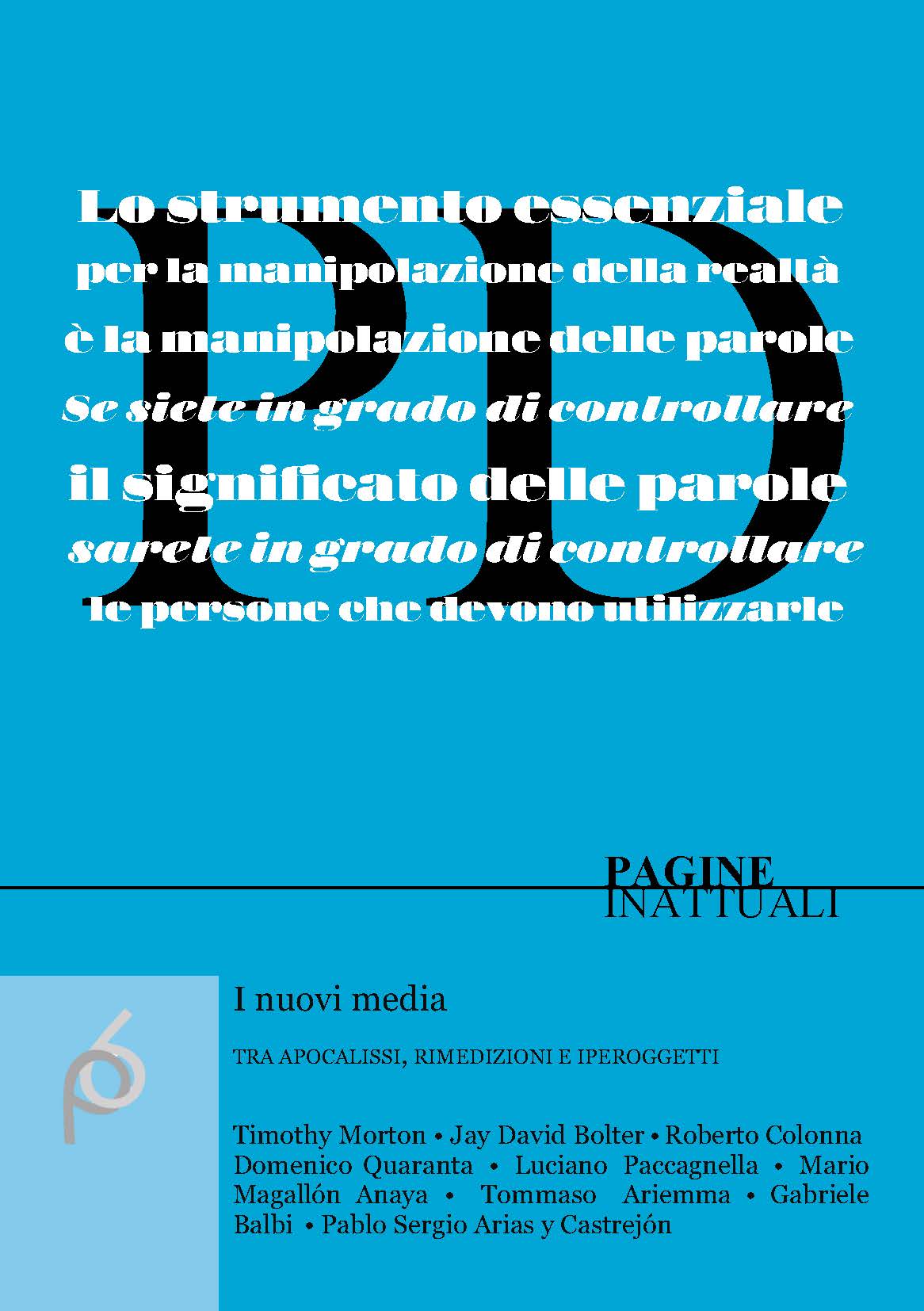 I nuovi media, tra apocalissi, rimediazioni e iperoggetti
N. 11 (2024)
I nuovi media, tra apocalissi, rimediazioni e iperoggetti
N. 11 (2024)Pagine Inattuali è da oggi disponibile al seguente nuovo indirizzo web:
https://serena.sharepress.it/index.php/pagineinattuali
Il sito attuale sarà invece dismesso e non sarà più aggiornato.
Ti invitiamo a visitare e salvare il nuovo link per continuare a seguirci.
---
I nuovi media costituiscono ormai una delle strutture portanti di quel sistema bipolare di Gemeinschaft-Gesellschaft in cui ogni individuo contemporaneo vive e afferma la propria dimensione pubblica. Il loro impatto, come quello di ogni nuova “macchina sociale”, ha prodotto profonde e significative conseguenze nelle dinamiche del mondo attuale, avviando un processo che non solo non è ancora terminato, ma si trova in piena e tumultuosa evoluzione.
Di fronte a questo fenomeno, si è sviluppato un dibattito che, come spesso accade in simili contesti, si è diviso tra coloro che intravedono nei nuovi media potenzialità e opportunità di miglioramento e chi, al contrario, ne evidenzia le insidiose derive e i pericoli di varia natura per l’umanità.
L’obiettivo di questo numero è di provare a tracciare uno stato dell’arte sui nuovi media, analizzando alcuni passaggi chiave che ne hanno segnato lo sviluppo e approfondendo le ricadute sociali e culturali che hanno già prodotto, con uno sguardo particolare sulle prospettive e le sfide che potrebbero emergere in futuro.
Licenza: Tutto il materiale pubblicato è distribuito con licenza “Creative Commons Attribuzione” (CC-BY 4.0)
-
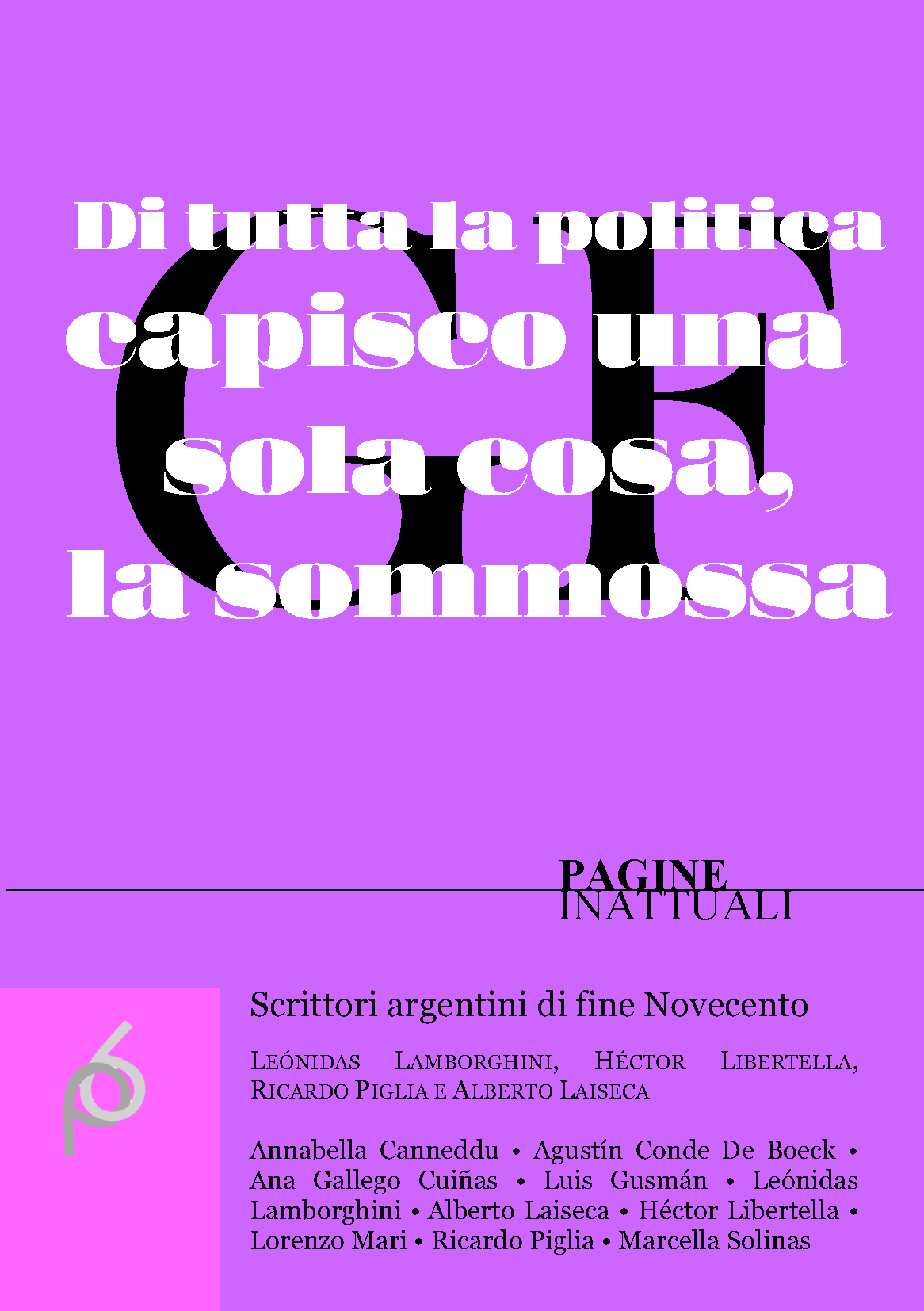 Scrittori argentini di fine Novecento. Leónidas Lamborghini, Héctor Libertella, Ricardo Piglia e Alberto Laiseca
N. 10 (2023)
Scrittori argentini di fine Novecento. Leónidas Lamborghini, Héctor Libertella, Ricardo Piglia e Alberto Laiseca
N. 10 (2023)Tra gli anni Sessanta e Settanta, una delle questioni più dibattute della letteratura argentina ha riguardato in che modo gestire l’eredità culturale di Borges e in particolare come rapportarsi all’onnipresenza del suo modello. Le poetiche emerse allora come risposta generazionale a quella tensione, sono ancora oggi un orizzonte insuperato per ciò che concerne sperimentazione e originalità. In quegli anni, infatti, un’intera generazione di scrittori, contrari a sfruttare opportunisticamente il grande successo internazionale della letteratura latinoamericana, si cimentò in due sfide di non poco conto: la prima fu alla tradizione culturale nella quale quegli scrittori si erano formati; la seconda ai risvolti commerciali delle loro opere, impegnandosi in progetti il cui fine dichiarato consisteva nell’evitare qualsiasi meccanismo di “cattura” del mercato.
A partire dal concetto di “letteratura ammutinata”, un concetto proposto da Libertella e rielaborato da Luis Gusmán, uno dei protagonisti di quella generazione, in questo numero di Pagine Inattuali saranno analizzate quattro figure di primo piano della letteratura argentina di fine Novecento, figure complementari e, allo stesso tempo, contrastanti, ossia Ricardo Piglia, Héctor Libertella, Leónidas Lamborghini e Alberto Laiseca. Pertanto, dopo un’intervista a Gusmán, si susseguiranno i saggi di Agustín Conde De Boeck, Lorenzo Mari, Annabella Canneddu, Ana Gallego Cuiñas e Marcella Solinas. Il numero si concluderà con alcuni estratti di opere narrative, oltre che dello stesso Gusmán, di Laiseca, Piglia, Libertella e Lamborghini.
Licenza: Tutto il materiale pubblicato è distribuito con licenza “Creative Commons Attribuzione” (CC-BY 4.0)
-
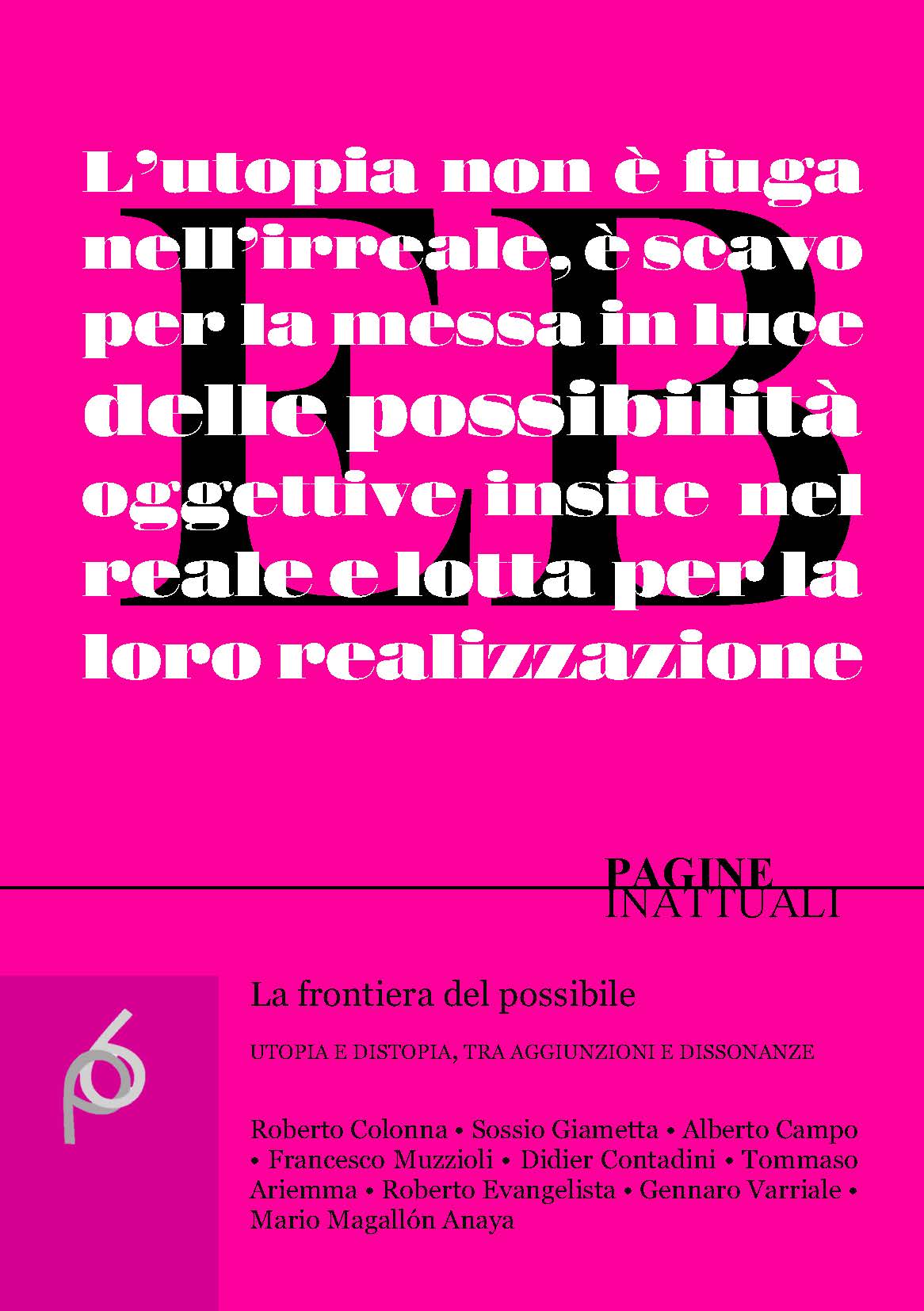 La frontiera del possibile. Utopia, e distopia, tra aggiunzioni e dissonanze
N. 9 (2022)
La frontiera del possibile. Utopia, e distopia, tra aggiunzioni e dissonanze
N. 9 (2022)L’utopia è una delle formulazioni concettuali più antiche e trasversali a cui l’umanità abbia dedicato i suoi sforzi creativi. I suoi ambiti di esercizio, infatti, riguardano e hanno riguardato tematiche di tipo politico, religioso, sociale ed economico, traslando riflessioni, precorse o scaturite, tanto nella letteratura che nella saggistica scientifica e non scientifica.
D’altronde, la definizione di un modello teorico, al di là della sua effettiva realizzazione, assume la vivificante funzione di stimolo per il miglioramento dei contesti in cui essa si sviluppa. Ed è probabilmente per questa ragione che l’utopia – anche nella sua apparente versione antitetica di distopia – non ha mai sofferto di quelle forme di decadenza dell’interesse a cui spesso vanno incontro costrutti di questo tipo. In tal senso, ogni epoca, si può dire, abbia le sue visioni utopiche, rappresentative delle prospettive e dei limiti del tempo che le ha partorite. Interrogarsi sull’utopia significa poter studiare un certo fenomeno sociale da un punto di vista privilegiato, a metà strada tra la critica del presente e la progettualità di un futuro non necessariamente prossimo. Significa avere la possibilità di trovarsi in un crocevia in cui si confrontano istanze critiche e aspirazioni di rinnovamento. Significa, persino, affermare pensieri e azioni che possono anche non trovare attuazione, inoculando così quella consapevolezza di poter essere vincolati a un destino di persistente instabilità e precarietà.
Sullo sfondo di suddette, brevi, considerazioni, questo numero di Pagine Inattuali prova ad offrire alcuni spunti di ricerca attraverso l’intervista a Sossio Giametta e i contributi di Alberto Campo, Francesco Muzzioli, Didier Contadini, Tommaso Ariemma, Roberto Evangelista, Gennaro Varriale e Mario Magallón Anaya.
Licenza: Tutto il materiale pubblicato è distribuito con licenza “Creative Commons Attribuzione” (CC-BY 4.0)
-
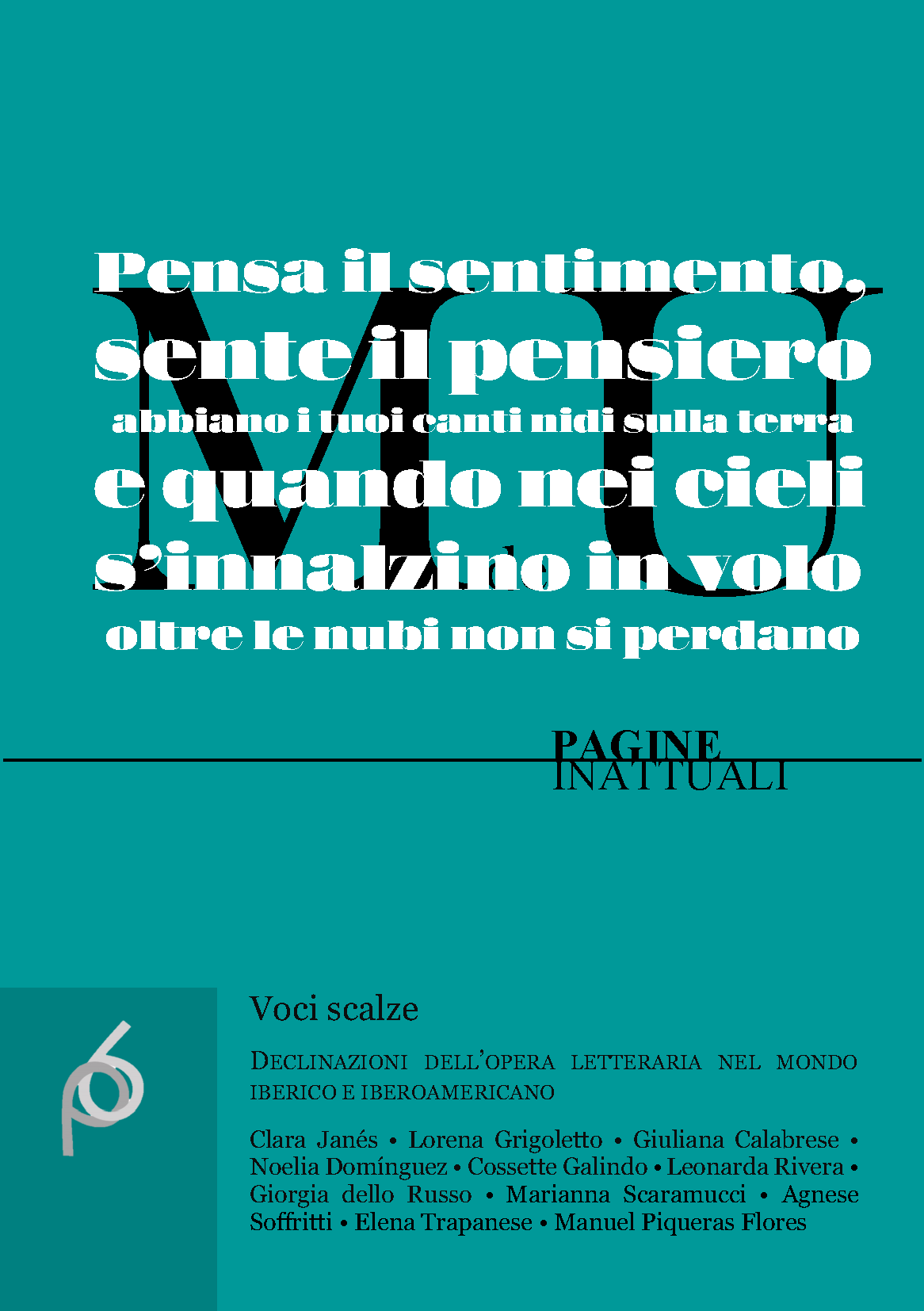 Voci scalze. Declinazioni dell’opera letteraria nel mondo iberico e iberoamericano
N. 8 (2019)
Voci scalze. Declinazioni dell’opera letteraria nel mondo iberico e iberoamericano
N. 8 (2019)L’ottavo numero di “Pagine Inattuali” raccoglie i contributi di autori e ricercatori di diversa formazione afferenti a università europee e latinoamericane. Il volume si propone di riflettere sul significato e sulla funzione dell’opera letteraria nel mondo iberico e iberoamericano con l’intenzione di esplorarne declinazioni e implicazioni tanto in ambito filosofico quanto letterario. La presunta specificità del “caso” spagnolo, e più in generale del bacino culturale latinoamericano, mostra infatti l’evidenza di un legame differente tra filosofia e letteratura, che impone di problematizzare tanto il dominio di ciascuno di questi ambiti disciplinari quanto la loro interazione e interdipendenza. Ciò consente di ripensare categorie del pensiero e declinazioni dell’opera letteraria da una prospettiva non semplicemente interdisciplinare, bensì “transdisciplinare”, che ha il pregio di mostrare come il rapporto tra letteratura e filosofia sia da considerarsi una questione sempre aperta e intimamente connessa, al di là di specifici confini territoriali e culturali, al processo di settorializzazione e iperspecializzazione dei saperi. In tal senso, il presente volume ha nondimeno l’obiettivo di sondare la questione identitaria vagliando, al contempo, modelli di razionalità alternativi.
A consacrare questo percorso di ricerca è una delle voci più riconosciute nel panorama della poesia spagnola contemporanea, Clara Janés. Il numero, infatti, si apre con un’intervista alla celebre scrittrice e traduttrice, chiamata a testimoniare di quell’irriducibile “eterodossia” spirituale che caratterizza la penisola iberica. In una sorta di controcanto, i nove saggi che compongono il volume sembrano volerci introdurre non tanto a una verità sul tema, bensì alla “vita della verità” – per dirla con la felice formula di Enzo Paci – così come si dipana in ambito filosofico e letterario nel contesto iberico e iberoamericano. I contributi affrontano le seguenti tematiche: il campo letterario e la letteratura minore nella poesia transatlantica (Calabrese); materia e nulla in un confronto sul tema della creazione tra Zambrano, Valente e Chillida (Domínguez Romero); Genesi e Apocalissi nella letteratura latinoamericana (Galindo Ayala); la metafora del castello in María Zambrano tra Teresa d’Avila e Franz Kafka (Grigoletto); la lettura della condanna platonica della poesia nelle riflessioni di María Zambrano e Eugenio Trías (Rivera); la letteratura di viaggio come esplorazione dell’Altro nelle Crónicas de Indias (dello Russo); l’articolazione fra trauma, suono e parola in Não falei di Beatriz Bracher (Scaramucci); Cesário Verde come flâneur alla portoghese (Soffritti); le declinazioni della scrittura in Sor Juana Inés de la Cruz (Trapanese / Piqueras Flores).Licenza: Tutto il materiale pubblicato è distribuito con licenza “Creative Commons Attribuzione” (CC-BY 4.0)
-
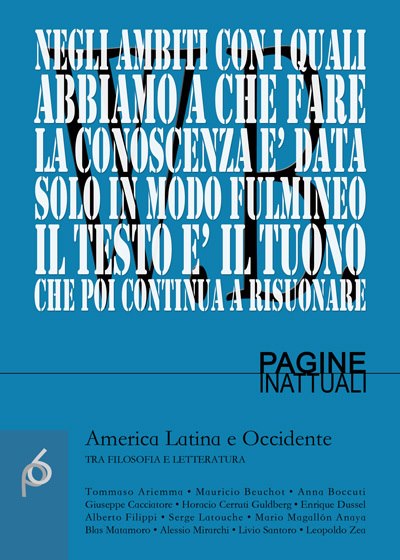 America latina e Occidente tra filosofia e letteratura
N. 1 (2012)
America latina e Occidente tra filosofia e letteratura
N. 1 (2012)Da oltre cinque secoli l’America Latina vive la sua cultura filtrata dal rapporto, talvolta ingombrante, con l’Occidente. La questione naturalmente non può essere ricondotta semplicisticamente allo schema servo-padrone, poiché nel corso del tempo gli attori in gioco hanno cambiato, più volte, non solo posizione, ma anche“significato”. La cultura latinoamericana ha infatti ripreso, reinventato e stravolto gli stimoli, le correnti e le idee che provenivano (e spesso erano imposti) dai salotti e dalle accademie delle città europee e statunitensi. Al punto che oggi, nel centenario della nascita di Leopoldo Zea, si può rispondere finalmente in modo affermativo alla celebre e provocatoria domanda, ¿Existe una filosofía en nuestra América?, che Augusto Salazar Bondy nel 1968 scagliò contro l’intellighenzia del suo Paese.
Attraverso i contributi di studiosi del calibro di Mauricio Beuchot, Anna Boccuti, Giuseppe Cacciatore, Horacio Cerutti Guldberg, Enrique Dussel, Serge Latouche, Mario Magallón Anaya e Blas Matamoro, il primo numero di Pagine Inattuali, muovendosi tra suggestioni letterarie e analisi filosofiche, riflette su questi temi e intende offrire uno spaccato di quel dibattito che da decenni caratterizza il continente latinoamericano.Licenza: Tutto il materiale pubblicato è distribuito con licenza “Creative Commons Attribuzione” (CC-BY 4.0)
Lingua
Informazioni
Pagine Inattuali è edita da FedOA - Federico II University Press, realizzata con Open Journal System e pubblicata dal Centro di Ateneo per le Biblioteche dell'Università di Napoli Federico II | © 2012 | Direttore responsabile: Roberto Colonna | ISSN 2280-4110
Pagine Inattuali è stata riconosciuta dall'ANVUR come rivista scientifica di fascia A per l'Area 11, settore 11/C5 (Storia della filosofia), e come rivista scientifica per l’Area 14 (Scienze politiche e sociali).
Tutto il materiale pubblicato in Pagine Inattuali è distribuito con licenza "Creative Commons - Attribuzione" (CC-BY 4.0)
